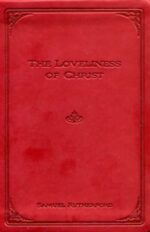save
$4.50Letters of Samuel Rutherford
$34.50$39.00
Charles Spurgeon said: “What a wealth of spiritual ravishment we have here! Rutherford is beyond all praise of men. Like a strong-winged eagle he soars into the highest heaven and with unblenched eye he looks into the mystery of love divine. There is, to us, something mysterious, awe- creating and superhuman about Rutherford’s letters.
This edition is a noble volume, and we shall measure the soundness of Scotch religion very much by the sale of this work. When we are dead and gone, let the world know that Spurgeon held Rutherford’s Letters to be the nearest thing to inspiration which can be found in all the writings of mere men.”
Richard Cecil said of Rutherford, “He is one of my Classics; he is a real original.” Richard Baxter said of Rutherford’s letters that, other than the Bible, such a book the world never saw as this collection of letters. Finally once again in a hardcover edition.
In stock
Letters of Samuel Rutherford
Charles Spurgeon said: “What a wealth of spiritual ravishment we have here! Rutherford is beyond all praise of men. Like a strong-winged eagle he soars into the highest heaven and with unblenched eye he looks into the mystery of love divine. There is, to us, something mysterious, awe- creating and superhuman about Rutherford’s letters.
This edition is a noble volume, and we shall measure the soundness of Scotch religion very much by the sale of this work. When we are dead and gone, let the world know that Spurgeon held Rutherford’s Letters to be the nearest thing to inspiration which can be found in all the writings of mere men.”
Richard Cecil said of Rutherford, “He is one of my Classics; he is a real original.” Richard Baxter said of Rutherford’s letters that, other than the Bible, such a book the world never saw as this collection of letters. Finally once again in a hardcover edition.
Letters on a A Rich Variety of Topics
- Sickness a kindness of God
- Greatness of Christ’s love revealed to those who suffer for Him
- God the satisfying portion
- Early devotion to Christ
- Nothing worth finding but Christ
- Danger of formality
- Unbelief under trials
- Christ to purifier of His church
- Counsel to a youth
- Nothing lost by trials
- Strive to enter in
- Christ’s crosses worth more than Egypt’s treasures
- Truth worth suffering for
- Cares to be cast on Christ
- Submission to God’s will
- Christ, not creatures, worthy of our love
- The Christian life a mystery to the world
- Heaven a reality
- Depression under dark trails
- Encouraging words to a suffering brother
- Gloomy prospects for a backsliding church
- On the death of a child
About the Author
Samuel Rutherford (1600–61) was born in the village of Nisbet, Roxburghshire, and educated at Jedburgh Grammar School and Edinburgh University (MA, 1621). From 1623 he acted as Regent of Humanity at the University, with responsibilities as a Latin tutor. There is a strong suggestion that 1624 was the date of his conversion, and he began reading theology at Edinburgh under Andrew Ramsay.
In 1627 he was settled as minister of Anwoth in Kirkcudbrightshire, and so began a ministry lasting only nine years, yet one ‘whose fragrance and power has left the name of Anwoth forever stamped on the hearts of Christian people’. In July 1636 the High Commission brought his ministry in Anwoth to an end because of his nonconformity, barring him from preaching in Scotland and exiling him to Aberdeen for the duration of the King’s pleasure. It was during his two years in Aberdeen that many of his much-loved Letters were written.
Covenanter Revolution
After the Covenanters’ revolution in 1638 Rutherford returned to Anwoth and was a commissioner to the Glasgow Assembly. The commission of that Assembly designated him Professor of Divinity at St Mary’s College, St Andrews. He consented to the office with the stipulation that he be permitted to preach regularly, and was made a colleague of Robert Blair in the city pulpit.
In 1643 Rutherford left for London as one of the Scottish Commissioners to the Westminster Assembly. He remained in the city four years, preached before the Long Parliament, took a prominent part in the Assembly’s debates on theology and Church polity, and published five major books. In his Lex, Rex (1644) Rutherford denied that a limitless sovereignty belonged to the King, and contended that the Crown is bestowed by the voluntary consent of the people, who are at liberty to resist a tyrant. In 1647 he resumed his duties at St Andrews and was soon made Principal of St Mary’s. In 1651 he became Rector of the University.
Restoration of Charles II
At the Restoration of Charles II in 1661 the Committee of Estates ordered the burning of Lex, Rex, deprived Rutherford of his offices, and cited him to come before Parliament to answer a charge of treason. Rutherford was already terminally ill and replied, ‘I have got summons already before a Superior Judge and Judicatory, and I behoove to answer to my first summons, and ere your day come, I will be where few kings and great folks come.’ Death indeed intervened before the charge could be tried.









